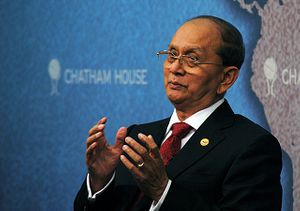Myanmar has a history of actually holding fair votes on Election Day, no matter the circumstances leading up to the vote. In 1990, after a brutal crackdown by the military on demonstrators two years earlier, the Myanmar armed forces allowed a free and fair election, which was won by the National League for Democracy (NLD). Of course, after the large NLD victory, there was no transition to democratic rule; the military came up with various excuses for not seating the parliament elected in 1990, and eventually made clear it would simply ignore the results of the election.
This time around, after reforms initiated by the Thein Sein government, the military is unlikely to simply step in and just annul the results of the autumn elections. But once again, just because Election Day is free and fair does not mean Myanmar will make a transition to a democratic government. Although the NLD is likely to win a significant share of seats in parliament, the election may be contested by as many as seventy political parties. The vote may be splintered, with many small parties winning a handful of seats.
Worse, as the ICG report notes, since Myanmar’s constitution still contains provisions that bar Suu Kyi from becoming president, even if the NLD wins a majority of seats in the election, it will have to find some other figure to take the presidency. This compromise figure could possibly be current speaker of the lower house Thura Shwe Mann. Yet such a compromise, which would be engineered in the three months between the election and the electoral college’s choice of a president, is likely to anger core NLD supporters, confuse some voters, and possibly lead to a power struggle between the president and NLD members in parliament unhappy that Thura Shwe Mann, a military man with no opposition credentials, had been handed the presidency. “It is unclear whether the NLD’s base fully understands likely post-election scenarios,” ICG writes.
A relatively weak president, not chosen directly by voters, could struggle to get anything done. A similar situation occurred after Abdurrahman Wahid became the Indonesian president in 1999, following a lot of backroom dealing, despite the fact that his party controlled only a small percentage of seats in parliament, compared to Megawati Sukarnoputri’s PDI-P. Or, as a Financial Times report on the upcoming Myanmar election notes, a weak president—but one with military ties—may be confronted by a parliament full of MPs who want to pass laws to weaken the institutional power of the armed forces, which ruled Myanmar for nearly six decades and harshly repressed the NLD for more than twenty years. If the compromise president cannot stop parliament from passing such laws (the Myanmar president does not have veto power over legislation), the military may feel it needs to step in directly once more.
Joshua Kurlantzick is a fellow for Southeast Asia at the Council on Foreign Relations. This post appears courtesy of CFR.org.

































